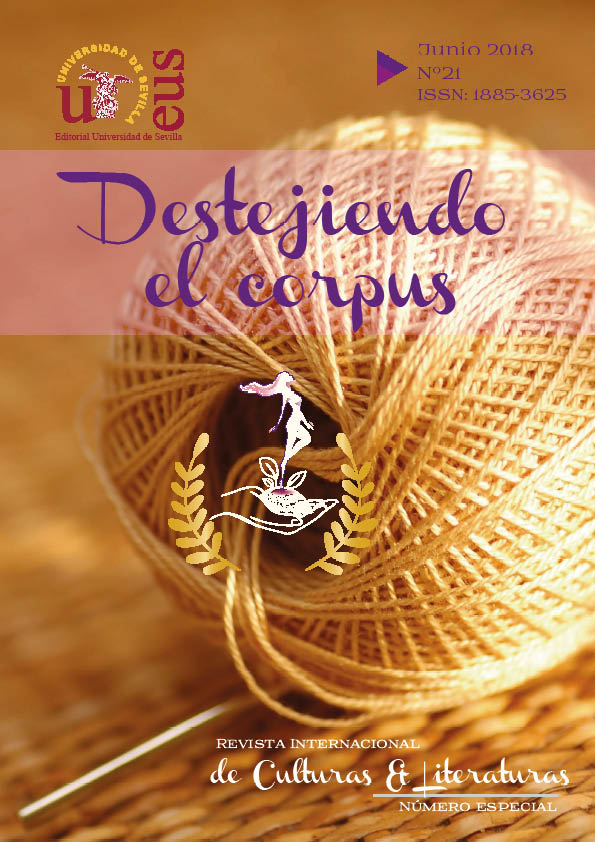THE FIGURE OF ANA CASTILLO AS A REPRESENTATIVE OF CHICAN FEMALE LITERATURE
DOI:
https://doi.org/10.12795/ricl.v0i21.4781Keywords:
escritoras chicanas, literatura chicana, identidad chicana, XicanismaAbstract
Chicano writers have found their way into the literary canons of the United States. Among them, authors such as Gloria Anzaldúa, Sandra Cisneros or Ana Castillo, among many others, stand out, who witness in their works the struggle of thousands of Latinos against a hegemonic culture that belittles them and in which they manage to achieve success. And especially, Ana Castillo, who courageously defends the figure of the Chicano woman.
Downloads
References
Alarcón, J.S., La Búsqueda de la Identidad en la Literatura Chicana, Madrid, Biblioteca Virtual Miguel de Cervantes, 2004.
Alarcón, N., Chicana’s Feminist Literature, New York, Women of Color Press, 2003.
Anzaldúa, G., Borderlands / La Frontera, San Francisco, Aunt Lute Books, 1987.
Baker, S., Ana Castillo: The Protest Poet Goes Mainstream, New York, Publishers Weekly, 12 de Agosto de 1996.
Barretto, J.C., Literatura Chicana: A Bibliography of Creative and Critical Mexican American Writings, San Francisco, City College of San Francisco Press, 1998.
Castillo, A., Massacre of the Dreamers: Essays on Xicanisma, Albuquerque, University of New Mexico Press, 1994.
Castillo-Speed, L., Latina: Women’s Voices from the Borderlands, New York, Touchstone Books, 1995.
Cortés Koloffon, A., “El Spanglish: La Frontera del Idioma”, La Jornada Semanal, nº 657, 2007.
Eguíluz Ortiz, F., Algunas Reflexiones para Entender la Literatura Chicana, Granada, Comanes, 2000.
Heyck, D.L., Barrios and Borderlands, New York, Routledge, 1994.
Hing, B.O., To Be an American: Cultural Pluralism and the Rhetoric of Assimilation, New York, New York University Press, 1997.
Hurtado, A., “Sitios y Lenguas”. Hypathia 13, 1998.
Hutcheon, L., The Politics of Postmodernism, New York, Routledge, 1995.
Kellogg, C., “Lambda Literary Awards laud best gay, lesbian and transgender books”, Los Angeles Times, 2 de junio de 2015.
León Jiménez, R., Textos sobre el Desarrollo del Movimiento Chicano, León, Servicio de Publicaciones de la Universidad de León, 2000.
Limón, J.E., “Stereotyping and Chicano Resistance”, Aztlán, vol. 4.2, 1973.
Lionnet, F., Postcolonial Representations, Ithaca, Cornell University Press, 1995.
Lomnitz-Adler, C., Cultura e Ideología en el Espacio Nacional Mexicano, México, Joaquín Mortiz-Planeta, 1995.
McWilliams, C., Al Norte de México: El Conflicto entre Anglos e Hispanos, Ciudad de México, Siglo XXI Editores, 1968.
Ortego, P.D., “Fables of Identity: Stereotype and Caricature of Chicanos”, The Journal of Ethnic Studies, vol. 1.1, 1973.
Rosaldo, R., Cultura y Verdad: Nueva Propuesta de Análisis Social, México, Grijalbo, 1991.
Rosales, J., “A Sojourn of Desire: Chicano Literature”, Aztlán, vol. 26.2, 2001.
Rothenberg, P., Race, Class and Gender in the United States, New Jersey, Worth Publishers, 2001.
Shea, R.H., No silence for this dreamer: The stories of Ana Castillo, New York, Poets and Writers, 2000.
Stavans, I., La Condición Hispánica, Ciudad de México, Harper Collins, 1999.
Vázquez, C., “La Mujer Chicana y la Importancia de su Espacio”, Horizontes 39, 1997.
Zavella, P., “The Problematic Relationship of Feminism and Chicana Studies”, Women’s Studies 17, 1989.
Zinn, H., A People’s History of the United States, Harlow, Longman, 2003.

